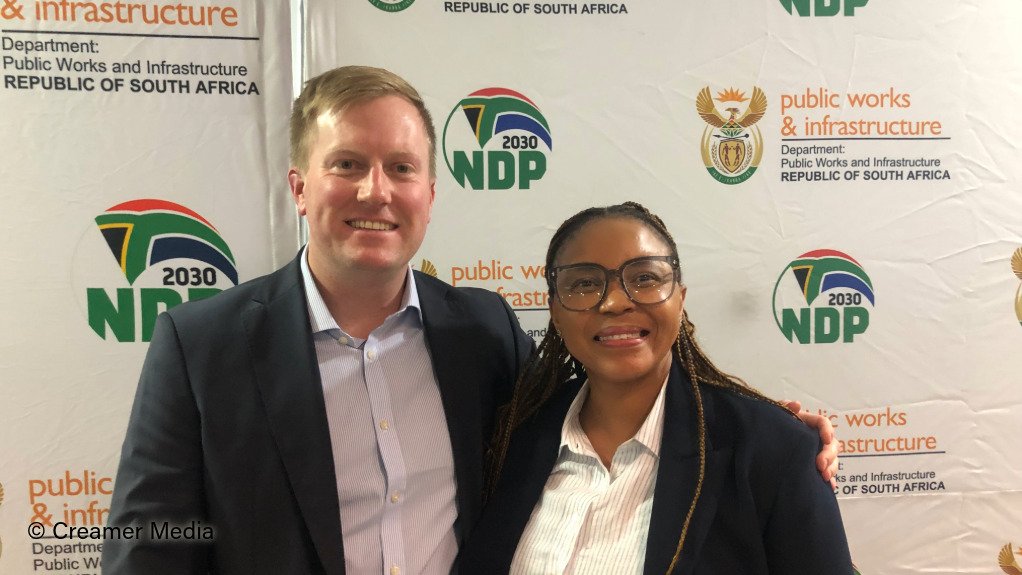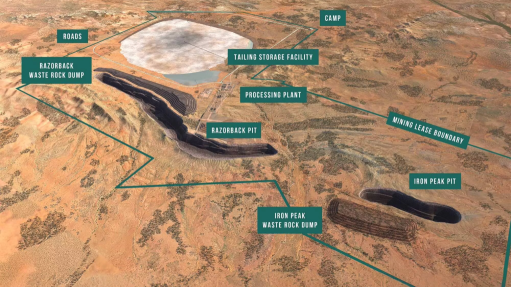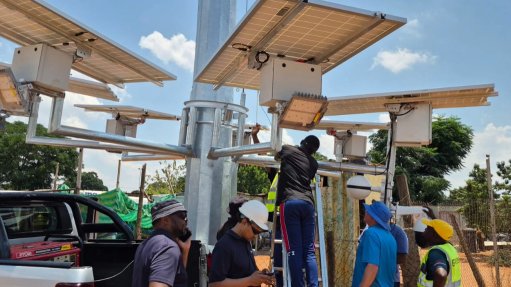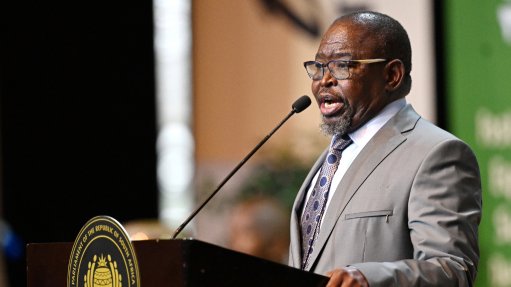DPWI, ISA launch project preparation bid window to expand infrastructure investment


Public Works and Infrastructure Minister Dean Macpherson and Infrastructure South Africa acting head Mameetse Masemola
Photo by Creamer Media
The Department of Public Works and Infrastructure (DPWI), together with government agency Infrastructure South Africa (ISA), has opened a novel project preparation bid window to invite submissions from national and provincial government departments, State-owned entities, public entities and municipalities to apply for project preparation support.
The project preparation support aims to expand the readiness of large-scale public sector construction projects worth more than R1-billion to be implemented, as one of the major contributing factors to underinvestment in infrastructure is the lack of sufficient project preparation support, Public Works and Infrastructure Minister Dean Macpherson said in Johannesburg on October 15.
The support will not be extended to private sector project applications unless submissions are made through public sector partners.
“The launch of this bid window is, in our view, a concretised step to get shovels into the ground and cranes into the sky. The stakes are high, but so are the rewards and, globally, the link between infrastructure investment and economic growth is well established,” Macpherson said.
Applications can be made on the ISA website until December 6. ISA acting head Mameetse Masemola said the focus would be on those qualifying projects that have the potential to crowd in investment from alternative sources, such as multilateral development banks and development finance institutions, other than the national fiscus.
She said that successful applicants will be announced at the next Sustainable Infrastructure Development Symposium South Africa (SIDSSA) next year, building on the 12 infrastructure initiatives previously announced by President Cyril Ramaphosa at the last SIDSSA in March.
These projects, worth about R180-billion, have already benefitted from the first R179-million in project preparation funding allocated by National Treasury to ISA to support catalytic projects that otherwise would not progress to the implementation stage.
Projects selected for the new bid window will receive comprehensive project preparation assistance, including funding and financial structuring support, technical support, legal support, institutional and governance arrangements, capacity deployment and regulatory and compliance studies.
“Because we have digitised the process, it's very transparent. It will allow us to receive this data, be able to analyse it even further and use the analysis to inform the way forward, insofar as project preparation funding is going to happen,” Masemola assured.
Several sectors will be considered as priority sectors for project preparation financing. These include energy, water and sanitation, transport (including major roads, airports, ports, and freight transport), human settlements (excluding student accommodation), social infrastructure (specifically education and health) and municipal infrastructure (with a focus on infrastructure projects that have the potential to leverage private sector financing), and infrastructure in industrial development zones and special economic zones.
Masemola said that, given current fiscal constraints, only three categories of projects would be considered.
First among these are those projects that are candidates for public-private partnerships (PPPs) and blended finance. The second category of projects will be those that are potentially commercially viable. The third category will be those social infrastructure programmes that have the potential to leverage or crowd in private sector financing.
“Excluded in the preparation support for projects will be those projects that will be 100% reliant on the fiscus. Those will not be the projects that we'll be looking to support,” Masemola emphasised.
Macpherson said research from international institutions such as the World Bank, McKinsey Global Institute and the International Monetary Fund shows that efforts to increase infrastructure investment by 1% can contribute to domestic economic growth of between 0.4% and 3%, a goal that Macpherson said he was committed to achieving during his term.
“For far too long, one of the major barriers to infrastructure development has been the lack of sufficient project preparation support. Without this critical support, many projects have stalled or failed to move beyond the planning stages.
“But, with today's announcements and action, we are removing this obstacle. We are providing the necessary tools to ensure that infrastructure projects are shovel-ready so that they can be implemented efficiently and effectively,” he said.
He added that this would also serve to increase the trust the private sector has to invest in state infrastructure projects.
“The project preparation will accelerate the pace and quality of infrastructure delivery, which will undoubtedly contribute to economic growth, with the aim that infrastructure investment contributes up to 1.5% economic growth in the medium term," MacPherson said.
He said that, in South Africa, studies done by Treasury and the South African Reserve Bank indicate that a 1% increase in gross-fixed capital formation, including infrastructure investment, can result in GDP growth of between 0.5% and 0.7%.
“We need to accelerate infrastructure investments to achieve at the minimum, the 1.5% economic growth target that is now within our reach. . . The IMF have said that we are possibly going to get to 1.8%, which is very encouraging, and we must play our part in terms of infrastructure. What this means for South Africa is that infrastructure investment is not just a priority, it is a necessity,” he said.
Macpherson highlighted the importance of blended finance models being added to this, which would allow the pool resources, the distribution of risk, and would ensure that infrastructure projects are financially viable and critically sustainable.
“Given the fund the fiscal constraints that we face, we cannot rely solely on public funding to finance our infrastructure ambitions. That is a reality and something that we need to come to grips with. This is why we are embracing innovative finance models such as blended finance and PPPs.”
“Blended finance, in particular, allows us to derisk projects, making them more attractive to the private market. We are also working to streamline the framework for PPPs, reducing bureaucratic delays and ensuring that these partnerships are structured to meet the needs of both the public and private sector,” he said.
Macpherson emphasised the role that these investments would make in addressing South Africa’s high unemployment rate.
“The importance of infrastructure investment extends far beyond growth. It's also one of the most powerful tools we have for job creation. By turning South Africa into a construction site, we can address our country's stubbornly high unemployment head on. The project preparation window is not just a policy announcement. It is also a call to action,” he said, noting that it was time to demonstrate results.
“Our country is desperate. They say there's all this money spent, but we can't actually see it. We still have sewage running down our streets. Lights don't come on or they trip, and we open our taps, there's no water. So, my message really is to all governments, all entities, to take advantage of this opportunity.
“I think that it can be incredibly successful. If we get it right, then there is scope for us to broaden it so that we actually see something for the R950-billion that's spent on infrastructure every three years. That's what people want to see,” Macpherson said.
Article Enquiry
Email Article
Save Article
Feedback
To advertise email advertising@creamermedia.co.za or click here
Press Office
Announcements
What's On
Subscribe to improve your user experience...
Option 1 (equivalent of R125 a month):
Receive a weekly copy of Creamer Media's Engineering News & Mining Weekly magazine
(print copy for those in South Africa and e-magazine for those outside of South Africa)
Receive daily email newsletters
Access to full search results
Access archive of magazine back copies
Access to Projects in Progress
Access to ONE Research Report of your choice in PDF format
Option 2 (equivalent of R375 a month):
All benefits from Option 1
PLUS
Access to Creamer Media's Research Channel Africa for ALL Research Reports, in PDF format, on various industrial and mining sectors
including Electricity; Water; Energy Transition; Hydrogen; Roads, Rail and Ports; Coal; Gold; Platinum; Battery Metals; etc.
Already a subscriber?
Forgotten your password?
Receive weekly copy of Creamer Media's Engineering News & Mining Weekly magazine (print copy for those in South Africa and e-magazine for those outside of South Africa)
➕
Recieve daily email newsletters
➕
Access to full search results
➕
Access archive of magazine back copies
➕
Access to Projects in Progress
➕
Access to ONE Research Report of your choice in PDF format
RESEARCH CHANNEL AFRICA
R4500 (equivalent of R375 a month)
SUBSCRIBEAll benefits from Option 1
➕
Access to Creamer Media's Research Channel Africa for ALL Research Reports on various industrial and mining sectors, in PDF format, including on:
Electricity
➕
Water
➕
Energy Transition
➕
Hydrogen
➕
Roads, Rail and Ports
➕
Coal
➕
Gold
➕
Platinum
➕
Battery Metals
➕
etc.
Receive all benefits from Option 1 or Option 2 delivered to numerous people at your company
➕
Multiple User names and Passwords for simultaneous log-ins
➕
Intranet integration access to all in your organisation


















